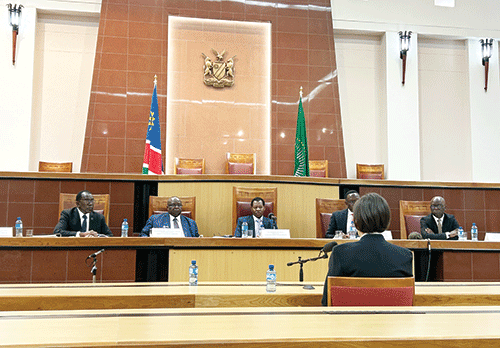The confidentiality of past interviews should not be misconstrued as a lack of transparency in the process, Chief Justice Peter Shivute said on Friday.
“The process has consistently maintained transparency. Nevertheless, changes in the Judicial Service Commission (JSC) Regulations 2011 now permit us to conduct interviews publicly, addressing legal constraints that previously prevented it,” he said shortly before the groundbreaking public interviews of three shortlisted candidates vying for positions in the High Court. The public interviews came after calls for transparency within the Judiciary, as voiced by the public, politicians and members of the legal community, particularly regarding the judges’ appointment processes. Candidates shortlisted were Lady Justice Philanda Christiaan (Acting), Advocate Slysken Makando, and Advocate Beatrix de Jager. After concluding her interview, acting judge Christiaan remarked that the process resembled any other internal interview. Nonetheless, she expressed support for Namibia’s shift towards transparency, considering it a positive step.
“It is normal for us to stress and feel anxious. But if you are yourself, you are able to do justice to the questions asked,” said Christiaan.
Commentators
New Era spoke to attendees to gather their perspectives on the matter. Political activist Job Amupanda commended the JSC for its transparency.
“We are absolutely happy with this development. The analysing of whether it meets the expectations is not important at the moment; we are celebrating the actualisation of the aspirations of transparency in our judiciary,”
he noted. Amupanda said it is the responsibility of all citizens to be aware and clear of what society is supposed to be.
At the end of each interview, Chief Justice Shivute informed the candidates that should they make it through the interview process, the judiciary does not provide any housing benefits, and they should make use of other provisions.
This, according to Amupanda, is one of the silent issues that the judiciary is dealing with.
“How is it that the Judicial Service Commission does not provide housing for the judges, and they must make other provisions? This question has been posed to candidates, and it tells you that housing is a serious issue. So, it is more than just interviews,” he added. Bank of Namibia governor Johannes !Gawanab, who was also in attendance, said it was an important milestone for the judicial interviews to go public. “This shows transparency in the section of the judges in our country. We just need to continue building on this because it can only be beneficial for the country in the end,” he observed.
Sharing similar sentiments was Law Society of Namibia president Clive Kavendji, who said the process of having public interviews is a good thing because Namibia is a free and democratic country. “To that end, the judges perform an important function in dispensing justice. So, it is also important for the citizenry to know the type of people we have on the bench. And I think the judiciary should be commended that they have taken this important step to conduct interviews in the open. I hope it is not a once-off, but will be a culture, going forward. The questions asked are interactive and
testing the technical expertise of the aspiring judges,” said Kavendjii.
- ashikololo@nepc.com.na


